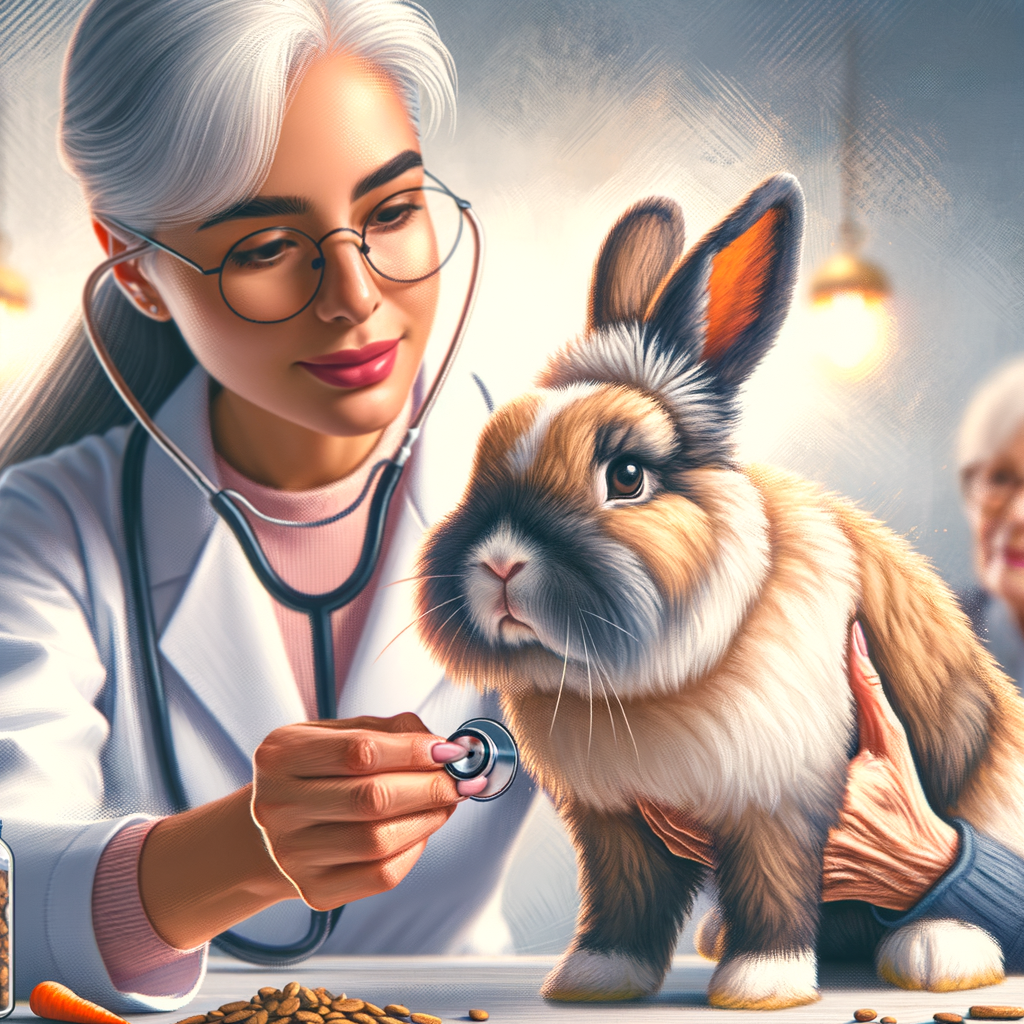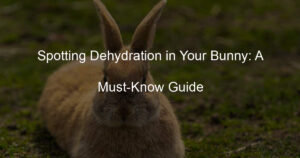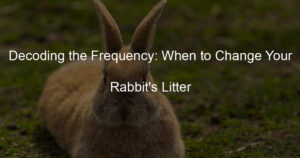
Introduction to Aging Lionhead Rabbit Care
As a rabbit owner, understanding the unique needs of your Lionhead rabbit as it ages is crucial. This guide will provide you with the necessary information to ensure your furry friend enjoys its golden years in comfort and good health.
- Understanding the Lionhead rabbit lifespan
- Importance of specialized care for aging rabbits
Lionhead rabbits have an average lifespan of 7 to 10 years. However, with proper care, they can live up to 12 years. As they age, their needs change, and they require more specialized care to maintain their health and wellbeing. It’s essential to understand these changes to provide the best possible care for your aging rabbit.
As Lionhead rabbits age, they become more susceptible to health issues such as arthritis, dental problems, and digestive issues. Providing specialized care tailored to their age-related needs can help manage these conditions and ensure your rabbit’s comfort. This includes regular vet check-ups, a balanced diet, and a comfortable living environment.
In the following sections, we will delve deeper into recognizing the signs of an aging rabbit, common health issues they face, and practical tips for caring for your elderly rabbit. We will also share some inspiring case studies of successful aging rabbit care. By the end of this guide, you will be well-equipped to embrace your rabbit’s golden years with confidence and love.
Recognizing the Signs of an Aging Rabbit
As your rabbit ages, it’s important to be aware of the changes they may experience. This will help you provide the best care and ensure they remain comfortable and happy in their golden years. Let’s explore some of the physical changes you may notice.
Physical Changes
Physical changes are often the first signs of aging in rabbits. These can include changes in their fur and skin, as well as a decrease in mobility. Let’s delve into these signs in more detail.
- Changes in Fur and Skin
- Decrease in Mobility
One of the most noticeable physical changes in an aging rabbit is the condition of their fur and skin. Their fur may start to thin, lose its shine, or even change color. Additionally, their skin may become dry and less elastic. It’s important to monitor these changes and provide appropriate care, such as gentle grooming and moisturizing skin treatments.
As rabbits age, they may not move around as much as they used to. You might notice your rabbit taking longer to get up, hesitating before jumping, or avoiding activities they once enjoyed. This decrease in mobility can be due to arthritis, a common issue in older rabbits. Regular, gentle exercise and a comfortable living environment can help manage this condition.
Recognizing these physical changes in your aging rabbit is the first step towards providing them with the care they need. In the next section, we will discuss the behavioral changes that can also occur as your rabbit ages.
Behavioral Changes
As your Lionhead rabbit ages, you may notice some changes in their behavior. These changes can be a sign that your rabbit is entering their golden years. Let’s take a closer look at two of the most common behavioral changes in aging rabbits: changes in eating habits and a decrease in activity levels.
- Changes in Eating Habits
- Decrease in Activity Levels
One of the first signs of an aging rabbit is a change in their eating habits. They may start eating less or show less interest in their food. This could be due to a loss of appetite, which is common in older rabbits. However, it could also be a sign of dental problems, which are common in older rabbits. If you notice a change in your rabbit’s eating habits, it’s important to consult with a vet to rule out any underlying health issues.
Another common sign of an aging rabbit is a decrease in activity levels. Older rabbits tend to be less active than younger ones. They may spend more time resting and less time hopping around. This is a normal part of aging, but it’s important to monitor your rabbit’s activity levels. If they become too sedentary, it could lead to weight gain and other health problems. Encouraging gentle exercise, like hopping around a safe, enclosed space, can help keep your aging rabbit healthy.
Remember, these changes are a normal part of aging and don’t necessarily mean that your rabbit is unwell. However, sudden or drastic changes in behavior can be a sign of illness and should be checked by a vet. By understanding and recognizing these behavioral changes, you can ensure that your rabbit’s golden years are as comfortable and happy as possible.
Senior Lionhead Rabbit Health Issues
As your Lionhead rabbit enters its golden years, it’s crucial to be aware of the common health issues that senior rabbits may face. Understanding these health problems can help you provide the best care for your furry friend.
Common Health Problems
Senior Lionhead rabbits, like other aging pets, can be prone to several health issues. Here are the most common ones:
- Arthritis: Arthritis is a condition that affects the joints and can cause pain and difficulty moving. In rabbits, it’s often seen in the hips and spine. Symptoms may include a decrease in activity, difficulty hopping, or a change in posture.
- Dental issues: Rabbits have teeth that continuously grow throughout their lives. If a rabbit’s diet doesn’t provide enough wear to keep up with this growth, it can lead to dental problems like overgrown teeth. This can make it hard for your rabbit to eat and can cause pain.
- Heart disease: Heart disease in rabbits can be hard to detect, as they often hide their symptoms. However, signs can include weight loss, difficulty breathing, and decreased activity. Regular vet check-ups are crucial for early detection and treatment.
These health issues can be serious, but with proper care and regular vet visits, they can be managed effectively. Remember, the best way to ensure your rabbit’s health in its golden years is through preventive care.
Preventive Measures
As the saying goes, prevention is better than cure. This is especially true when it comes to caring for our senior Lionhead rabbits. There are several measures we can take to ensure they stay as healthy as possible in their golden years.
- Regular Vet Check-ups
- Proper Diet
- Physical Therapy
Regular visits to the vet are crucial in maintaining your rabbit’s health. These check-ups allow for early detection of potential health issues, which can be treated promptly. A vet can also provide valuable advice on caring for your aging rabbit. It’s recommended to have at least two vet visits per year for senior rabbits.
A balanced diet plays a significant role in your rabbit’s health. As they age, their dietary needs may change. Senior rabbits often require more fiber and less sugar in their diet. Consult with your vet about the best diet plan for your rabbit. Remember, a healthy diet can prevent many health issues such as obesity and dental problems.
Physical therapy can be beneficial for senior rabbits, especially those suffering from arthritis. It helps to maintain their mobility and reduce pain. Simple exercises can be done at home, like encouraging your rabbit to move around and play. However, always consult with your vet before starting any new physical therapy routine.
In conclusion, preventive measures are an essential part of caring for an aging Lionhead rabbit. Regular vet check-ups, a proper diet, and physical therapy can significantly improve their quality of life and longevity. Remember, our furry friends rely on us to keep them healthy and happy in their golden years.
Caring for Elderly Rabbits: Practical Tips
As your Lionhead rabbit enters its golden years, it’s essential to adjust its care routine to meet its changing needs. One of the most critical areas to focus on is diet. A well-balanced diet can significantly contribute to your rabbit’s health and longevity.
Senior Lionhead Rabbit Diet
As rabbits age, their dietary needs change. It’s crucial to understand what food types are best for senior Lionhead rabbits and how much they should be eating.
- Recommended food types
- Portion sizes
Senior rabbits need a diet rich in fiber to aid digestion and prevent obesity. Hay should form the bulk of their diet, particularly timothy hay, which is lower in calories and calcium than alfalfa hay. Fresh vegetables like bell peppers, broccoli, and leafy greens can provide necessary vitamins and minerals. Avoid feeding them too much fruit due to its high sugar content.
Portion control is vital for senior rabbits to prevent weight gain. A good rule of thumb is to provide a pile of hay that’s at least as big as the rabbit itself each day. For fresh vegetables, aim for about one cup per 2 pounds of body weight. Remember, treats should make up less than 10% of your rabbit’s diet.
Remember, every rabbit is unique, and what works for one may not work for another. Always consult with a vet to create a personalized diet plan for your senior rabbit.
Exercise and Activity
Keeping your senior rabbit active is crucial for their overall health and well-being. This includes both physical exercise and mental stimulation. Let’s explore some safe exercises for your aging rabbit and understand the importance of keeping their minds sharp.
- Safe exercises for senior rabbits
- Light Hopping: Encourage your rabbit to move around their living area. This can be as simple as hopping from one end to the other. Remember, the goal is not to exhaust them, but to keep them moving.
- Gentle Play: Engage your rabbit in gentle play sessions. You can use their favorite toys to stimulate movement. However, ensure the play is not too vigorous.
- Exploration: Allow your rabbit to explore new areas under your supervision. This can stimulate their curiosity and encourage movement.
- Importance of mental stimulation
- Puzzle Toys: These toys require your rabbit to solve a problem to get a reward, usually a treat. This can keep their minds engaged and active.
- Training Sessions: Simple training sessions using positive reinforcement can be a great way to mentally stimulate your rabbit. You can teach them simple commands or tricks.
- New Experiences: Introducing your rabbit to new experiences can stimulate their minds. This could be a new toy, a new area to explore, or even a new food to try.
As rabbits age, their mobility can decrease due to various health issues. However, this doesn’t mean they should stop exercising. Here are some safe exercises for your senior rabbit:
Mental stimulation is just as important as physical exercise for senior rabbits. It helps keep their minds sharp and can even slow the progression of age-related cognitive decline. Here are some ways to mentally stimulate your rabbit:
In conclusion, maintaining a balance of safe physical exercise and mental stimulation can significantly improve the quality of life for your senior rabbit. Remember, every rabbit is unique, so it’s important to tailor these activities to suit your rabbit’s individual needs and capabilities.
Rabbit Golden Years: Making Them Comfortable
As your rabbit enters its golden years, it’s essential to make some adjustments to ensure its comfort and happiness. Here are two key areas to focus on:
- Creating a safe living space
- Providing companionship
Creating a Safe Living Space
As rabbits age, they may experience decreased mobility and vision. It’s important to create a safe, accessible environment for them. Here are some tips:
- Limit Stairs: Older rabbits may struggle with stairs. Try to keep their living area on one level.
- Non-Slip Flooring: Hardwood and tile floors can be slippery for rabbits. Consider adding rugs or mats for better grip.
- Easy Access to Essentials: Ensure food, water, and litter boxes are easily accessible. This can mean placing these items in multiple locations.
Providing Companionship
Rabbits are social animals and thrive on companionship. As they age, their need for social interaction does not diminish. Here are some ways to provide companionship:
- Quality Time: Spend time with your rabbit every day. This can include petting, grooming, or just sitting together.
- Another Rabbit: Consider adopting another rabbit, preferably one that is also older. They can provide each other with company and stimulation.
- Interactive Toys: Toys can provide mental stimulation. Try puzzle toys or toys they can toss and chew.
Remember, every rabbit is unique. What works for one may not work for another. Always observe your rabbit’s behavior and adjust accordingly. With love and care, you can make your rabbit’s golden years truly golden.
Case Studies: Successful Aging Rabbit Care
Let’s delve into some real-life examples of successful aging rabbit care. These case studies will provide you with insights into the practical application of the tips and strategies we’ve discussed so far. They will also show you that with the right care, your rabbit can live a long, healthy, and happy life.
- Case study 1: A Lionhead rabbit living beyond average lifespan
- Case study 2: Managing arthritis in an elderly rabbit
Meet Fluffy, a Lionhead rabbit who lived to the ripe old age of 12, well beyond the average lifespan of 7-9 years for her breed. Fluffy’s owner, Jane, attributes her long life to a balanced diet, regular exercise, and lots of love and attention. Jane made sure Fluffy had a diet rich in hay, fresh vegetables, and a small amount of pellets. She also ensured Fluffy had plenty of space to hop around and play. Regular vet check-ups were also a part of Fluffy’s routine, helping to catch any potential health issues early.
Next, we have Thumper, an elderly rabbit who developed arthritis in his later years. His owner, Mark, noticed Thumper was moving less and seemed to be in pain. After a visit to the vet, Thumper was diagnosed with arthritis. Mark was proactive in managing Thumper’s condition. He made modifications to Thumper’s living area, such as adding extra padding to his sleeping area and lowering the height of his food and water dishes. Mark also started Thumper on a vet-recommended medication to manage his pain. With these changes, Thumper was able to continue living a comfortable and happy life.
These case studies highlight the importance of attentive care and regular vet check-ups for aging rabbits. They also show that with the right care, it’s possible for rabbits to live beyond their average lifespan and manage health conditions successfully.
Conclusion: Embracing Your Rabbit’s Golden Years
As we reach the end of our journey, it’s important to reflect on the joy and rewards that come with caring for an aging rabbit. While it may seem daunting at first, the bond you share with your furry friend during their golden years is truly special.
- The joy and rewards of caring for an aging rabbit
- Recap of key takeaways
- Recognizing the signs of aging in rabbits is crucial. Changes in appetite, energy levels, and behavior are key indicators.
- Senior rabbits can face health issues like arthritis, dental problems, and digestive issues. Regular vet check-ups can help manage these conditions.
- Practical care tips include providing a comfortable living space, maintaining a balanced diet, and ensuring regular exercise.
- Creating a comfortable environment during their golden years can significantly improve their quality of life.
- Case studies have shown that with proper care and attention, rabbits can live happily and healthily into their golden years.
There’s a unique sense of fulfillment that comes from providing care and comfort to your aging rabbit. As they grow older, their dependence on you increases, and so does their trust. This deepens the bond between you two, making the experience rewarding. Moreover, their calm and gentle demeanor in their golden years can bring a sense of peace and happiness to your home.
Let’s quickly revisit what we’ve learned about caring for an aging rabbit:
In conclusion, embracing your rabbit’s golden years is not just about providing care, but also about cherishing the unique moments and experiences that come with it. Remember, your rabbit’s golden years can be just as golden for you too!




